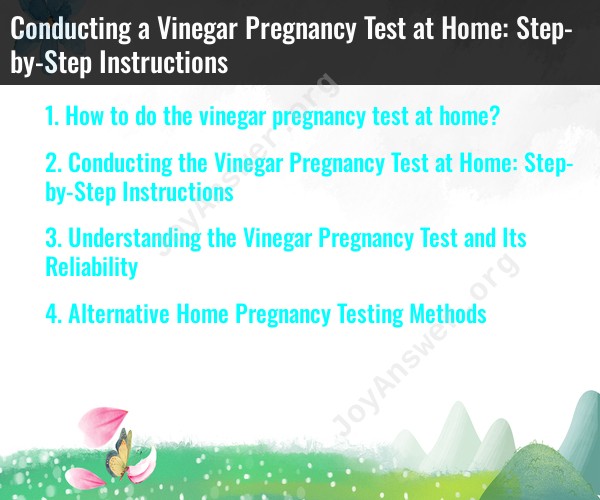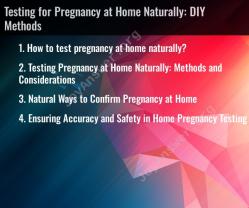How to do the vinegar pregnancy test at home?
The vinegar pregnancy test is not a reliable or scientifically validated method for confirming pregnancy. It's essential to use medically approved pregnancy tests that are available at drug stores or to consult with a healthcare professional for accurate results. Vinegar is not a reliable indicator of pregnancy, and relying on such tests may lead to incorrect conclusions.
Home pregnancy tests that use urine samples are designed to detect the presence of human chorionic gonadotropin (hCG), a hormone produced during pregnancy. These tests have been rigorously tested and are known for their accuracy. If you suspect you may be pregnant, it's strongly recommended to use a reputable home pregnancy test or consult with a healthcare provider for proper testing and guidance.
Here are the general steps for using a traditional urine-based home pregnancy test:
Choose a Home Pregnancy Test: Purchase a reliable home pregnancy test from a drugstore or pharmacy. There are various brands and types available.
Read the Instructions: Carefully read and follow the instructions provided with the test. Instructions may vary slightly depending on the brand.
Collect a Urine Sample: Typically, you will need to collect a urine sample in a clean, dry container. Some tests can be used directly in the stream of urine, while others require you to dip a test strip into a urine sample.
Conduct the Test: Follow the instructions for conducting the test. This may involve adding a few drops of urine to a specific area on the test, waiting for a designated amount of time, and observing the results.
Read the Results: After the designated waiting period (usually a few minutes), check the test for the results. Most tests will provide clear indicators, such as lines or symbols, to show whether you are pregnant or not.
Follow Up: If the test indicates that you are pregnant, it's important to schedule an appointment with a healthcare provider to confirm the pregnancy and discuss prenatal care and other important considerations.
Remember that the accuracy of home pregnancy tests increases with time, so it's typically best to take the test a few days after your missed period. If you get a positive result, it is advisable to consult a healthcare professional for further guidance and confirmation. The vinegar pregnancy test and similar DIY methods are not reliable indicators of pregnancy and should not be relied upon for making important healthcare decisions.
Conducting the Vinegar Pregnancy Test at Home: Step-by-Step Instructions
The vinegar pregnancy test is a home pregnancy test that uses vinegar to detect the presence of the pregnancy hormone hCG in urine. The test is based on the idea that vinegar will change color when it comes into contact with hCG.
To conduct the vinegar pregnancy test:
- Collect a sample of your first morning urine in a clean container.
- Pour some vinegar into a separate container.
- Add your urine to the vinegar and watch for a reaction.
If the vinegar changes color to yellow or green, it is a positive result. If the vinegar does not change color, it is a negative result.
Understanding the Vinegar Pregnancy Test and Its Reliability
The vinegar pregnancy test is not a reliable way to test for pregnancy. It is not as accurate as commercial pregnancy tests and it can produce false positive results.
False positive results can occur if the vinegar is contaminated with other substances, such as blood or bacteria. False positive results can also occur if the woman is taking certain medications, such as antibiotics or diuretics.
Alternative Home Pregnancy Testing Methods
There are a number of other home pregnancy testing methods available, including:
- Commercial pregnancy tests: Commercial pregnancy tests are more accurate than the vinegar pregnancy test. They are easy to use and can be purchased at most pharmacies.
- Ovulation predictor kits: Ovulation predictor kits can be used to predict when ovulation is likely to occur. This can help you to plan your sex life around your fertility cycle if you are trying to get pregnant.
- Basal body temperature (BBT) charting: BBT charting can be used to track your body temperature throughout your menstrual cycle. This can help you to identify ovulation and to predict when your next period is likely to start.
If you are unsure whether or not you are pregnant, it is best to see a doctor or other healthcare provider for a professional pregnancy test.




